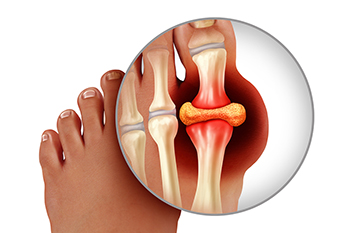
Gout is an arthritic condition that results from a buildup in the system of uric acid that crystallizes in the joints and causes inflammation. Gout can flare up overnight and last for a week or so before calming down. There are a few stages of gout, including asymptomatic, acute, interval or intercritical, and chronic tophaceous. Pseudogout is often confused with gout because the symptoms are similar even though the causes differ. This type of gout is actually caused by the crystallization of calcium deposits, and the flare-ups are less severe. The main symptom of gout is excruciating pain, commonly in the big toe, redness, swelling, and stiffness. A person can have high uric acid levels without experiencing the symptoms, but this can ultimately cause tissue damage. Acute gout flares up suddenly, and interval gout is the period between flare-ups. These intervals may become shorter, but because uric acid continues to build up, gout may become chronic. This is the most painful form of gout and can develop into kidney disease if not treated. If you believe you have any form of gout, it is suggested that you consult a podiatrist for treatment options.
Gout is a foot condition that requires certain treatment and care. If you are seeking treatment, contact Dr. Howard Horowitz from Bowie Foot & Ankle . Our doctor will treat your foot and ankle needs.
What Is Gout?
Gout is a type of arthritis caused by a buildup of uric acid in the bloodstream. It often develops in the foot, especially the big toe area, although it can manifest in other parts of the body as well. Gout can make walking and standing very painful and is especially common in diabetics and the obese.
People typically get gout because of a poor diet. Genetic predisposition is also a factor. The children of parents who have had gout frequently have a chance of developing it themselves.
Gout can easily be identified by redness and inflammation of the big toe and the surrounding areas of the foot. Other symptoms include extreme fatigue, joint pain, and running high fevers. Sometimes corticosteroid drugs can be prescribed to treat gout, but the best way to combat this disease is to get more exercise and eat a better diet.
If you have any questions please feel free to contact our office located in Bowie, MD . We offer the newest diagnostic and treatment technologies for all your foot and ankle needs.
